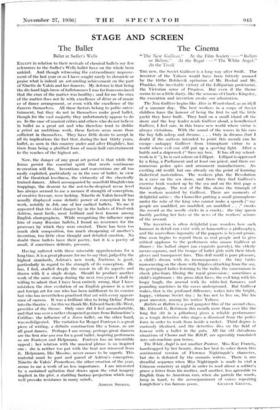Ballet at Sadler's Wells
STAGE AND SCREEN
Excuse in relation to their revivals of classical ballets my few references, to the Sadler's Wells ballet have on the whole been unkind. And though witnessing the extraordinary improve- ment of the last year or so I have sought rarely to chronicle or praise what is indeed an astounding achievement on the part of Ninette de Valois and her dancers. My defence is that being the die-hard high-brow of balletomanes I was far from convinced that the crux of the matter was healthy ; and for me the crux of the matter does not lie with excellence of decor or of music or of dance arrangement, or even with the excellence of the dancers themselves. All these factors belong to polite enter- tainment, but they do not in themselves make good ballet, -though for the vast majority they unfortunately appear to do so. In the case of musical critics and others who do not believe in ballet as a great art and who therefore tend to dislike a priori an ambitious work, these factors seem more than sufficient in themselves. They have little desire to accept in all its implications the fact that, during the last thirty years, ballet, as seen in this country under and after Diaghilev, has risen from being a glorified form of music-hall entertainment to the reaches of the highest art.
Now, the danger of any great art period is that while the forms persist the essential spirit that needs continuous re-creation will flee. Inventions and conventions are all too easily exploited, particularly so in the case of ballet, in view of the theatrical loveliness, the virtuosity of the classically trained dancer. Albeit accompanied by manifold Diaghitevian trappings, the descent to the not-to-be-despised revue level has always seemed to me a menace if strength of conception, of creative fervour, were lacking. Ninette de Valois herself has usually displayed some definite power of conception in her work, notably in Job, one of her earliest ballets. To me it appeared that the chief danger lay in the ballets of Frederick Ashton, most facile, most brilliant and best known among English choregraphers. While recognising the influence upon him of many Russian ballets, I found no reverence for the processes by which they were created. There has been too much slick composition, too much cheapening of another's invention, too little close thought and detailed emotion. No doubt these ballets have their poetry, but it is a poetry of small, if sometimes delicate, pressure.
Having suffered with these miserable apprehensions for a long time, it is a great pleasure for me to say that, judged by the highest standards, Ashton's new work, Nocturne, is good, particularly in regard to the strength of its conception. He has, I feel, studied deeply the music in all its aspects and drawn with it a single design. Should he produce another work of the same stamp during the next two years I shall be willing to admit that I have been entirely wrong, that I have mistaken the slow evolution of an English pioneer in a new and foreign art for one who has been indifferent to its essence but who has nevertheless practised that art with every appear- ance of success. It was a brilliant idea to bring Delius' Paris into the theatre : for this we thank Mr. Edward Sackville-West, provider of the theme. Only once did I feel uncomfortable, and that was over a rather cheapened gesture from Balanchine's Cotillon: the influence of a Jooss ballet, on the other hand, *HMS welldigested. The variation for Margot Fonteyn is a great piece of writing, a definite construction like a house, as are all good dances. Perhaps I am wrong, perhaps great dancers are the first sine qua non for a good ballet, inspiring performers as arc Fonteyn and Helpmann. Fonteyn has an irresistible appeal : her relation with the musical phrase is an inspired one ; she is neither too pat with the beat nor removed from it. Helpmann, like Massine, never ceases to be superb. This material must be part and parcel of Ashton's conception. Ninette de Valois' Prometheus, the other creation of the year, seems to me a work of no less importance. I am interested by a sustained agitation that draws upon the vital imagery implicit in the plot, a startling fantasy-projection which may well provoke resistance in many minds.
ADRIAN STOKES.














































 Previous page
Previous page